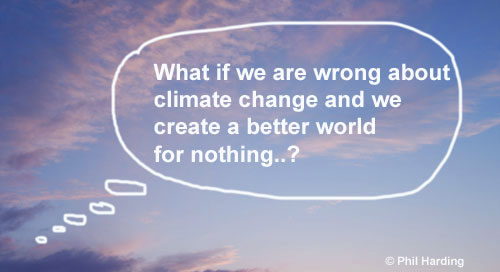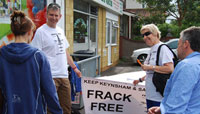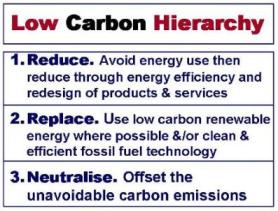|
Saltford Environment Group
|
| Home | About Us | News | Website Contents & Links | Contact |

|
SEG Home > Energy (low carbon) Energy (low carbon)"Wasting energy costs the earth" We can all take steps to stop wasting energy, whether it's changing our habits or through improving our homes. In our businesses, reducing energy costs and carbon emissions also makes perfect business sense. As global demand for finite fossil fuels outstrips available supplies leading to much higher energy costs and the prospect of energy shortages, energy efficiency and the use of renewable energy sources provide a better, cleaner and more secure future whilst reducing our carbon emissions that lead to climate change (see our climate change page for information, advice and guidance on adapting to climate change impacts).
For the latest sources of advice and grants for saving energy at home see our 'Energy in the home' section below. SEG Activities (incl. Climate Emergency response)Climate Emergency In March 2019 B&NES Council passed a Climate Emergency Resolution. The Council resolved to:
SEG in partnership with Saltford Parish Council will maintain a watching brief on developments from B&NES Council for delivering this resolution and help ensure Saltford plays its part in responding to the climate emergency. Advice and Guidance We have suggested sources of advice and guidance on this page to help you find the relevant source of independent advice and expertise that you need for reducing your energy costs and carbon footprint at home or in the workplace (see the links on the top right hand side of this page). Fracking Between 2012 and 2018 SEG lobbied Government and supported local campaigns to resist fracking or Coal Bed Mathane extraction in this area. The Government announced in 2019 that fracking will not be allowed to proceed in England. We have a Fracking page where you can discover more about this highly controversial subject. Hydro-electric power SEG held discussions with Bath & West Community Energy (BWCE) in 2012 concerning the potential for hydro-electric power generation on the River Avon in Saltford. The head heights of the two weirs on our river are low (around 1 metre) and make the use of most turbine technologies including modern designs for water wheel/turbine systems only marginal in the present climate. Nevertheless, we remain hopeful that at some point a suitable solution that is sound on both a technical and economic level can be found for generating hydro-power in Saltford whilst the emergence of funding support for renewable energy schemes from central Government or from B&NES would be welcome... Energy in the home'Are YOU doing your bit? Think global, act local' When we waste energy at home we are not only wasting our own money but we are also causing 'avoidable pollution'. We show in this section sources of advice including grants to help householders reduce their energy consumption in the home. Latest sources of adviceEnergy at Home Advice ServiceB&NES Council and the Centre for Sustainable Energy are working together to give residents across B&NES easier access to grants and loans for insulation and boiler upgrades as well as energy assessments and advice. Whilst some of the funding schemes are subject to eligibility, there is free and impartial advice available to all householders. You can ring the Energy at Home Advice Service on freephone 0800 038 5680 or visit www.energyathome.org.uk for further details. Helping consumers reduce energy waste and save moneyCutting out energy waste in the home needs to be done on a continuous basis, not a one-off exercise. Examples of what you can do include 'no cost' actions such as taking better control of your energy through switching off lights, TV and chargers when you're not using them. Taking better control of your heating and water using appliances can lead to significant cost savings too. Here are some 'no cost' QUICK ENERGY SAVING TIPS :- Turn it down! Turn it off! Boil what you need! Walk (or cycle) more, drive less! Avoid packaging! Stop those drips! Shorter, sharper showers! Launder it all! Cook with care! Don't put hot food in the fridge! Defrost food in the fridge! After 'no-cost' actions, there are cost-effective measures you can take including improved insulation, draught proofing, better controls on your heating system such as a timer or programmer and thermostatic radiator valves (TRVs), and choosing higher energy efficiency rated light bulbs and appliances. There have been significant improvements in energy efficiency technologies in recent years, lighting being just one example, so to make sure you are making the right choices, it pays to get accurate and independent advice. The Energy Saving Trust gives energy advice services at a national and local level for a range of clients, including government and the private sector. It gives impartial up-to-date advice to householders on how to reduce carbon emissions, how to use water more sustainably and how to save money on energy bills. The advice for householders is available from the Energy Saving Trust's website at: www.energysavingtrust.org.uk or from the "Simple Energy Advice" freephone helpline 0800 444202 (Mon - Fri 8am-8pm & Sat & Sun 9am-5pm) and its associated website www.simpleenergyadvice.org.uk. Cost of living support (incl. on energy)In October 2022 a "Cost of living support" web page was launched by B&NES Council that provides information on services and support for residents who may be affected by the rising cost of living during the ongoing crisis affecting many households. On the "Cost of living support" web page information and advice concerning support with food, energy and money, a warm spaces directory, details of services and organisations that can help families who have money worries and other support services including the Community Wellbeing Hub can be found. The "Cost of living support" web page can be found from this external link B&NES Council's Energy at Home Scheme (link) aims to help residents improve the energy performance of their homes by providing information on energy related home improvements, financial assistance schemes and signposting to suitable installers and contractors. The financial assistance is for eligible households that meet certain criteria (household income must be below £30,000 per year; an Energy Performance Certificate rating of D, E, F or G; and the property must not use gas central heating). There is also Affordable Warmth (link) funding for residents in the B&NES area who meet the following eligibility criteria: Household income must be below £30,000 per year and have less than £30,000 of savings. Calculate your environmental footprint
Our lifestyle choices make up our environmental/carbon footprint and how we make an impact on the environment. The WWF 'My Footprint app' can be downloaded at http://footprint.wwf.org.uk/ and enables you to calculate your environmental footprint then choose and track challenges to help you make small changes in your own life that add up to something bigger. Energy in the workplace'Going low-carbon is the only option for a profitable, future-proof business' If your business is wasting energy it is causing avoidable pollution, primarily through increased carbon emissions and thereby contributing to climate change. But wasting energy also reduces your profitability. For every £1 saved on energy costs, most UK businesses would have to make £10 worth of sales to make the same £1 of profit. So, for example, every £100 wasted on energy due to poor energy management requires £1,000 worth of sales to make the equivalent £100 of profit. SEG recognises that most of our local businesses have energy requirements that are similar to a domestic household and for this reason we suggest that you contact the Energy Saving Trust (contact details in the "Energy in the home" section above) in the first instance for advice on how you can reduce your energy costs. If you have a more industrial use of energy and use motors and drives, compressed air (delivered energy can be as high as 10 times the cost of electricity!) or steam in your industrial process, for example, there could be significant scope for energy savings and specialist advice is recommended. For sources of local energy/environmental solutions, expertise and support etc. Business West provides a local access point for business (tel: 01275 373 373).
The most cost-effective approach for reducing your carbon footprint is to apply the 'Low Carbon Hierarchy': 1. REDUCE energy use by avoiding unnecessary use and implementing energy efficiency measures. You should include the design of your goods and services and also look up and down your supply chain. Once you have increased your efficiency you should then look to 2. REPLACE fossil fuels with renewable energy sources and/or use cleaner fossil fuel technology such as Combined Heat and Power (CHP) where it is feasible to do so. Finally, having reduced your carbon emissions through avoiding waste, energy efficiency and use of renewable cleaner sources, you can 3. NEUTRALISE the remaining unavoidable emissions through carbon offsetting schemes. Travel'Of total UK energy use (in 2011), transport accounted for 37.5%' - DECC You can reduce your energy consumption and save money by using the car less. If you walk or cycle (see our cycling page) for those shorter trips it's better for the environment and for your health. Using public transport where available can also reduce energy waste, carbon emissions and local air-pollution, especially by reducing congestion at peak periods. The Energy Saving Trust (contact details in the "Energy in the home" section above) has information, advice and resources about energy-saving travel - including how you can avoid using the car, and how to drive more efficiently when you can't avoid it. One of the objectives behind SEG's station campaign has been to provide an alternative to road travel for Saltford's commuters. © Saltford Environment Group |
Page Links:-SEG Activities (incl. Climate Emergency response) Energy in the home - incl. 'no cost' quick energy saving tips Energy in the workplace - incl. 'Low Carbon Hierarchy' |





